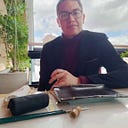About Riddles.....
Riddles do not exist. Otherwise the riddle, translated in a real question, would indicate some way how to treat it; they’d be targets not reached yet. However, certain perplexities being an extreme challenge to be even litterally understood, sound important to us. One may call them: the nonsensical strong remarks or ideas. (We are not interested in puns or stupid tricks.) They are much a matter of seeing, just of looking at the facts intensely; not an effort with abstruse arguments manoeuvring words and definitions. Still, this job of seeing those ideas will amount to just words, dialogues, when we want to acknowledge or report what is seen then. And so they will be words such that they are not saying, at all, but they do express something. This has quite a similarity to logical subtle verse, poetry, or novels, theater. Pirandello. Dostoiévski. Great logicians! Certain nonsensical great ideas are experience usual in childhood, where they strike the children’s mind, astonishing. We want usually to put them — perhaps in the form of questions — in logical common prose. Mommy, why am I me and am not my brother? Now, one of many riddles is the famous Socrate’s finding the lost key.
2. Lots of different kinds and ways of pictures and representations are today the world that is so presented. Films, selfies, the well known paintings, the newspaper, even the fairy tales… everything is the world (our world) given in such ways, very different ways from each other: all things have we so printed in books, said, stated, referred or shown. Either believed or not believed. Now, as soon as the key is found by Socrates, then just that is what he had in mind and was looking for. It is recognized. Of course! Yet, this may seem to be puzzling. It cannot be said. It is somewhat similar to a tautology together with a contradiction. In fact, the dominion of saying anything at all lies between these ultimate limits, which both say nothing: tautology and contradiction. Such limits just show life. They are the revelation. This is obtained, even more than in the oriental great logicians, through the expressive punctual reasoning and debate. Our job (the philosopher’s job) is to evoke a sort of stupor together with a sharp light before something neat and unspeakable. It may seem absurd that the key is in Socrate’s mind, already before being found in the world out of his head. On the other hand it must be so. If not, he did not know what to look for untill the moment when he finds it. We say, well, that’s easy, sure, he had in mind an icon, a concept, a name, a meaning (the meaning of a noun) as well as a symbol or a simulacrum, an effigy… Of course. Ok. Hence, he had something else in mind. Which, anyway, wasn’t the very key he was looking for? Why yes!
3. These are — as also Wittgenstein himself put it — the kinds of those great questions that do not arise. “Questions that are not asked.” Which are not put there, useless, not producing real inquiries. Words unemployed. Children’s language. Philosophical language. The mystical. What we feel the most important. The mind prisoner in the glass bottle just has to acknowledge the astonishment. The solution wouldn’t do. It would be mistaken, whatever it is. Wittgenstein says, to Schlick: we do not want a theory. It is not a riddle. For it puts no question: nothing that lets you imagine a way how to answer it. Indeed, it is the very light. The evident. We just understand and appreciate the funny glass labyrinth in its own form, in its true transparency. “The perspicuous vision.” We get it, grasp it. Extremely similar (he said) to a deep joke, or a wit. Indeed, the world: as it is.
